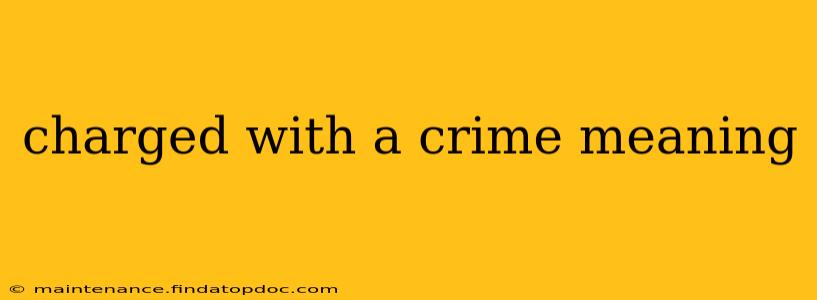Being "charged with a crime" is a significant legal event with serious consequences. It marks the formal beginning of the criminal justice process against an individual. This post will delve into the meaning of this phrase, outlining the steps involved and addressing common questions surrounding criminal charges.
What Does it Mean to be Charged With a Crime?
Being charged with a crime means that law enforcement believes there is enough evidence to suggest you committed a specific offense. This isn't a conviction; it's an accusation. The prosecution, representing the state or government, will now attempt to prove your guilt beyond a reasonable doubt in a court of law. The charge itself is a formal accusation documented in a legal document, often called an indictment or a complaint. This document outlines the specific crime(s) you are accused of, the date(s) the alleged crime(s) occurred, and the relevant statutes violated.
What Happens After You're Charged With a Crime?
The process following a criminal charge can vary depending on the severity of the alleged crime and the jurisdiction. However, several common steps generally follow:
- Arrest (Sometimes): While not always immediately necessary, an arrest often precedes formal charges. The police may arrest you based on probable cause, then present evidence to a prosecutor to secure formal charges.
- Arraignment: This is your first court appearance after being charged. You'll be informed of the charges against you and asked to enter a plea (guilty, not guilty, or no contest).
- Bail or Detention: The judge may set bail, allowing you to be released pending trial, or order detention if the charges are serious or if the judge believes you pose a flight risk.
- Discovery: Both the prosecution and the defense exchange evidence, including witness statements, police reports, and forensic evidence.
- Plea Bargain Negotiations (Often): The prosecution may offer a plea bargain, allowing you to plead guilty to a lesser charge in exchange for a reduced sentence.
- Trial (If Necessary): If a plea bargain isn't reached, the case proceeds to trial, where a jury or judge will determine your guilt or innocence.
- Sentencing (If Convicted): If found guilty, you will be sentenced according to the law and the severity of the crime.
What are the Different Types of Charges?
Criminal charges vary widely in severity, ranging from misdemeanors to felonies.
- Misdemeanors: These are generally less serious offenses, often punishable by fines, probation, or short jail sentences. Examples include petty theft or simple assault.
- Felonies: These are more serious crimes, carrying harsher penalties, including lengthy prison sentences. Examples include murder, robbery, and drug trafficking.
What are the consequences of being charged with a crime?
The consequences of a criminal charge can be significant and long-lasting, impacting various aspects of your life, including:
- Legal penalties: Fines, probation, jail or prison time, community service.
- Reputation damage: A criminal record can severely affect your employment prospects, social standing, and personal relationships.
- Loss of certain rights: Depending on the offense, you might lose the right to vote, own a firearm, or hold certain professional licenses.
- Civil lawsuits: You could face additional lawsuits from victims seeking compensation for damages.
What should I do if I'm charged with a crime?
If you're charged with a crime, it's crucial to seek legal counsel immediately. An experienced criminal defense attorney can explain your rights, guide you through the legal process, and advocate for your best interests. Do not speak to law enforcement without an attorney present.
This information is for educational purposes only and is not legal advice. Always consult with a qualified legal professional for guidance on your specific situation.
